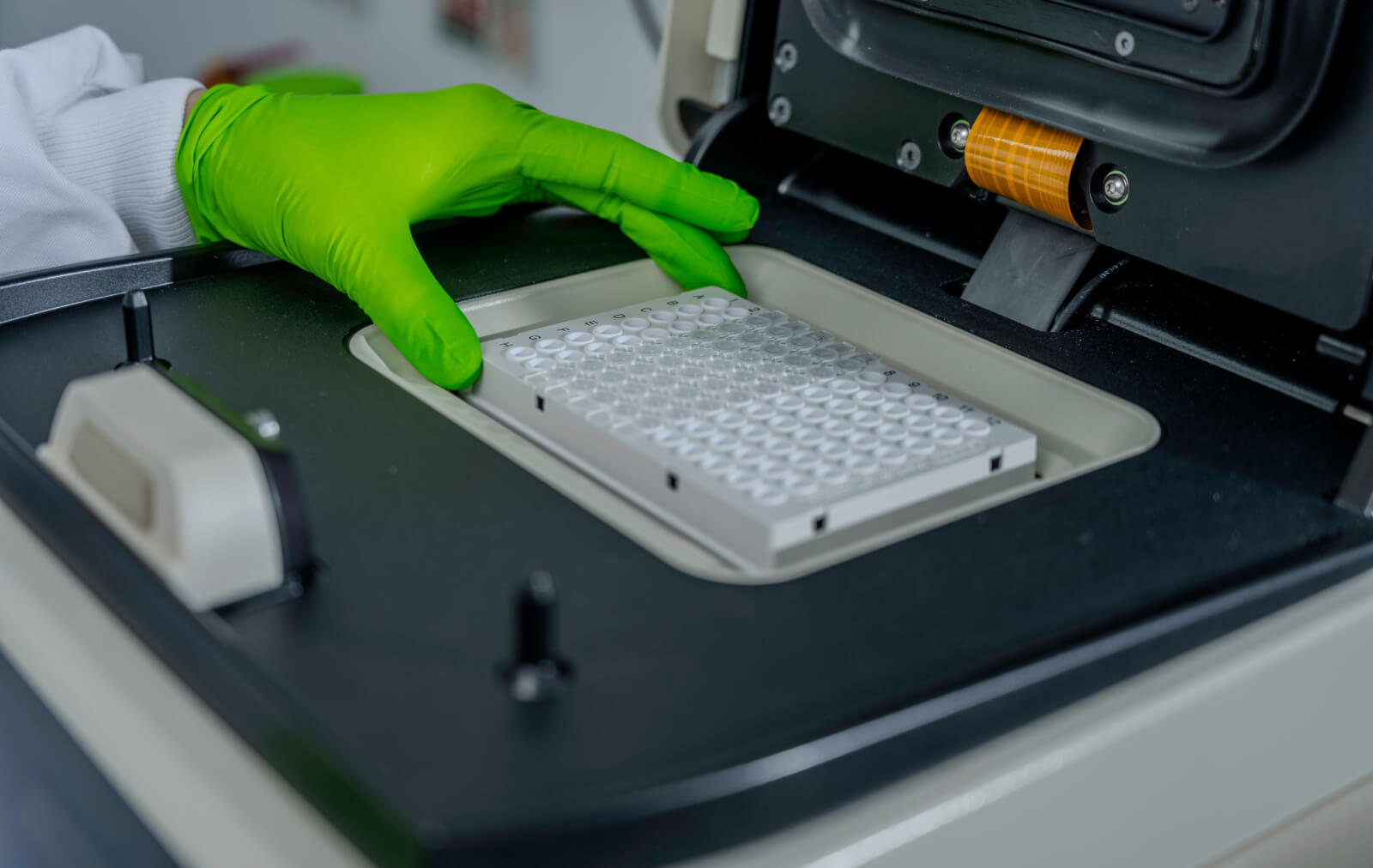
PCR and qPCR Master Mixes
PCR/qPCR
-
Fast qPCR Mix
-
Low DNA qPCR Mix
-
Inhibitor-Tolerant qPCR/RT-qPCR Master Mixes
-
Air-Dryable™ Direct DNA and RNA/DNA qPCR Stool
-
Air-Dryable™ qPCR and RT-qPCR Mixes Master Mixes
-
Air-Dryable™ Direct DNA and RNA/DNA qPCR Blood Master Mixes
-
Air-Dryable™ Direct DNA and RNA/DNA qPCR Saliva Master Mixes
-
Lyo-Ready qPCR Mix
-
Lyo-Ready qPCR Mix, 2.6x
-
Lyo-Ready Direct DNA and RNA/DNA qPCR Blood Master Mixes
-
Lyo-Ready Direct DNA and RNA/DNA qPCR Saliva Master Mix
-
Lyo-Ready Direct DNA and RNA/DNA LAMP Saliva Master Mixes
-
Lyo-Ready Direct DNA and RNA/DNA qPCR Stool
-
Lyo-Ready Genotyping Direct qPCR FFPE
-
Lyo-Ready Genotyping Direct qPCR Blood
-
Lyo-Ready Genotyping Direct qPCR Urine
-
High-Specificity Pfu HS Mix
Not seeing what you’re looking for? Inquire about a new product
PCR and qPCR Master Mixes for Fast, Sensitive Assays
PCR and qPCR Master Mixes are essential tools for developing fast, reliable, and highly sensitive assays in molecular diagnostics. Designed for exceptional performance, these master mixes optimize DNA amplification, enabling precise detection and quantification of genetic material. Whether in research or clinical settings, PCR and qPCR Master Mixes ensure consistent results, even in challenging applications, by providing robust amplification and minimal error rates.
At Meridian Bioscience, our PCR and qPCR Master Mixes are tailored to meet the diverse needs of molecular workflows, ensuring reproducibility, speed, and sensitivity. We support advancements in genetic testing, infectious disease research, and personalized medicine with high-quality reagents. Discover how our PCR and qPCR Master Mixes can elevate the accuracy and efficiency of your molecular assays.
Key Features:
- Enhanced specificity for accurate amplification.
- Optimized for fast cycling and superior sensitivity.
- Suitable for a wide range of molecular applications.
Make every assay count with PCR and qPCR Master Mixes designed to deliver precise and reliable outcomes.
Catalogs & Brochures
High-Specificity Pfu HS High-Specificity Pfu HS
Lyo-Ready Genotyping Direct qPCR Blood< Lyo-Ready Genotyping Direct qPCR Blood
Lyo-Ready Genotyping Direct DNA qPCR Stool Lyo-Ready Genotyping Direct DNA qPCR Stool
Lyo-Ready Genotyping Direct DNA qPCR Urine Lyo-Ready Genotyping Direct DNA qPCR Urine
Air-Dryable Direct Blood Master Mixes Air-Dryable Direct Blood Master Mixes
Lyo-Ready Direct Blood Master Mixes Lyo-Ready Direct Blood Master Mixes
Lyo-Ready Direct Saliva Master Mixes Lyo-Ready Direct Saliva Master Mixes
Air-Dryable Direct Saliva Master Mixes Air-Dryable Direct Saliva Master Mixes
Air-Dryable Direct Stool Master Mixes Air-Dryable Direct Stool Master Mixes
Lyo-Ready Genotyping Direct qPCR FFPE Lyo-Ready Genotyping Direct qPCR FFPE
Lyo-Ready Direct Stool Master Mixes Lyo-Ready Direct Stool Master Mixes
Air-Dryable Direct Urine Master Mixes Air-Dryable Direct Urine Master Mixes
Lyo-Ready Direct Urine Master Mixes Lyo-Ready Direct Urine Master Mixes
Lyo-Ready Direct LAMP Urine Mixes Lyo-Ready Direct LAMP Urine Mixes
Related Products
1/ Two buffers optimized for independent RT and real-time PCR 2/ Highly sensitive 3/ Recommended when the reaction is performed with a limiting amount of starting material 4/ More efficient because random primers and oligo d(T) can be used 5/ Possibility to stock cDNA to quantify several targets.
When performing a reverse transcription reaction for a two-step quantitative PCR assay, it is possible to use different primer strategies. Random hexamer primers, which bind anywhere on the RNA allow full coverage of total RNA (including ribosomal, bacterial and viral RNA), oligo d(T)n (or anchored oligo d(T)n), which binds to the poly-A tail of the mRNA which is located at the extremity of the transcript, leading to full transcripts, a mixture of random hexamer and oligo d(T)n that reduces the risk of bias in cDNA synthesis and specific primers, which bind to the transcript of interest. The ability to optimize both cDNA and quantitative PCR reactions separately and the higher cDNA yields, two-step reactions can be more sensitive than one-step reactions. The ability to separately optimize these reactions is also beneficial when performing multiplex qPCR on challenging sequences.
With a chemical hot-start DNA polymerase, the polymerase is covalently linked with chemical groups to block enzyme activity at room temperature. Advantages 1/ More stringent than antibody hot-start methods, so there is no activity even for long periods at room temperature, minimizes non-specific amplification 2/ Low bioburden, as it is free of animal and bacterial-origin components Considerations 3/ Longer activation time required for the polymerase to become fully active.
Aptamers are engineered oligonucleotides that bind to the active site of the high-fidelity DNA polymerase but are denatured and released as the temperature is increased during the PCR amplification cycle. This aptamer-mediated inhibition/activation process is however fully reversible, and so at the end of thermal cycling, when the temperature of the reaction is decreased, the aptamer refolds and rebinds to high-fidelity DNA polymerase, inhibiting any further activity in the sample. This has proven to be important in workflows where undesired polymerase activity after reaction completion can disturb baseline readings, such as NGS following amplification of a library.
Yes, reaction conditions are the same and they will produce the same Ct values, even with multiplex qPCR assays. This means that the liquid mixes can be used to create SOPs if you do not want to lyophilize and then later if lyophilization is required (for example to increase sensitivity), the SOP can be updated for lyophilization, it does not require completely new SOPs to be written.
Following drying in the presence or absence of primers and probes, they are stable for a minimum of 24 months at ambient temperature (17 – 23 °C). Following rehydration, the assay reproducibility, sensitivity, and robustness will be the same as for a freshly made liquid mix, making the mixes ideal for point-of-care molecular diagnostic tests and microfluidic qPCR devices.
Get In Touch With A Specialist
Have questions about a product? Want to learn more about Meridian’s molecular or immunoassay reagent portfolio? We want to hear from you!